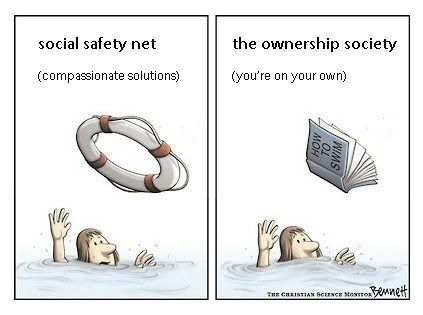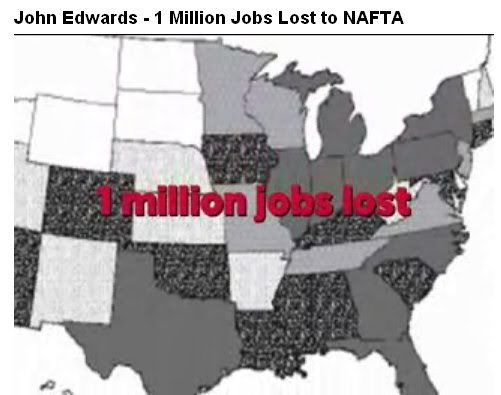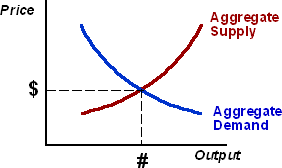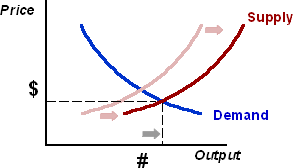Since the days of Reagan, America has been chasing a Theory.
Since the Clinton era, and the rise of NAFTA and Global Free Trade, our “Corporate Leaders” have been conducting an unprecedented Social Experiment.
The Experiment: Economic Darwinism
The Test Subjects in this Experiment: none other than American Workers and our “more competitive” counterparts, overseas.


Supply-siders have argued that Economic Growth comes from empowering Corporate Interests to become “More Productive”, by whatever means necessary. Be it “Tax-Give-aways to the Wealthy”, or “Job-Give-aways to Poor Foreigners”, well that's just fine with them, long is it results in Corporate Growth.
Supply-siders are happy to trade away American Dignity for the sake of short-term Profits: “American Workers just need some retraining. They just need to apply themselves.”
“We just need to learn to Adapt” … (to Global Markets?)
That's the Theory, that's the Spin. What are the Results of this on-going plan to outsource the American Dream?
So what is Supply Side Economics, and how did these Theorists manage to trump the classical Keynesian school of thought? (John Maynard Keynes Theories ushered in the Middle Class Boom of the last century, by the way.)
Supply-side theorists advocate income tax reduction because it increases private investment in corporations, facilities, and equipment
Understanding Supply-Side Economics
by David Harper, CFA
Supply-side economics is better known to some as “Reaganomics”, or the “trickle-down” policy espoused by former U.S. president Ronald Reagan. He popularized the controversial idea that greater tax cuts for investors and entrepreneurs provides incentives to save and invest and produce economic benefits that trickle down into the overall economy. In this article, we summarize the basic theory behind supply-side economics.
…The Argument That Supply Creates Its Own Demand
In economics we review the supply and demand curves. The left-hand chart below illustrates a simplified macroeconomic equilibrium: aggregate demand and aggregate supply intersect to determine overall output and price levels. (In this example, output may be gross domestic product and the price level may be the Consumer Price Index.) The right-hand chart illustrates the supply-side premise: an increase in supply (i.e. production of goods and services) will increase output and lower prices.
Supply-side actually goes further and claims that demand is largely irrelevant. It says that over-production and under-production are not really sustainable phenomena. Supply-siders argue that when companies temporarily “over-produce”, excess inventory will be created, prices will subsequently fall and consumers will increase their purchases to offset the excess supply
…
Conclusion
Supply-side economics has a colorful history. Some economists view supply-side as a half-baked economic theory – economist and New York Times columnist Paul Krugman even called its founders “cranks” in a book dedicated to attacking the theory (“Peddling Prosperity”)…
Indeed Paul Krugman had some very interesting things to say about Global Trade and Outsourcing today. The USA has just passed a new threshold on imports:
NY Times
Dec 28, 2007
By PAUL KRUGMAN
…
But recently we crossed an important watershed: we now import more manufactured goods from the third world than from other advanced economies. That is, a majority of our industrial trade is now with countries that are much poorer than we are and that pay their workers much lower wages.
…Let’s talk for a moment about the economics.
Trade between high-wage countries tends to be a modest win for all, or almost all, concerned. When a free-trade pact made it possible to integrate the U.S. and Canadian auto industries in the 1960s, each country’s industry concentrated on producing a narrower range of products at larger scale. The result was an all-round, broadly shared rise in productivity and wages.
By contrast, trade between countries at very different levels of economic development tends to create large classes of losers as well as winners.
Although the outsourcing of some high-tech jobs to India has made headlines, on balance, highly educated workers in the United States benefit from higher wages and expanded job opportunities because of trade. For example, ThinkPad notebook computers are now made by a Chinese company, Lenovo, but a lot of Lenovo’s research and development is conducted in North Carolina.
But workers with less formal education either see their jobs shipped overseas or find their wages driven down by the ripple effect as other workers with similar qualifications crowd into their industries and look for employment to replace the jobs they lost to foreign competition. And lower prices at Wal-Mart aren’t sufficient compensation.
…The trouble now is that these effects may no longer be as modest as they were, because imports of manufactured goods from the third world have grown dramatically — from just 2.5 percent of G.D.P. in 1990 to 6 percent in 2006.
And the biggest growth in imports has come from countries with very low wages. The original “newly industrializing economies” exporting manufactured goods — South Korea, Taiwan, Hong Kong and Singapore — paid wages that were about 25 percent of U.S. levels in 1990. Since then, however, the sources of our imports have shifted to Mexico, where wages are only 11 percent of the U.S. level, and China, where they’re only about 3 percent or 4 percent.
… The highly educated workers who clearly benefit from growing trade with third-world economies are a minority, greatly outnumbered by those who probably lose.
As I said, I’m not a protectionist. For the sake of the world as a whole, I hope that we respond to the trouble with trade not by shutting trade down, but by doing things like strengthening the social safety net. But those who are worried about trade have a point, and deserve some respect.
Krugman seems worried about the effect of NAFTA, and the continuing trend for more Outsourcing. And Krugman seems to be advocating the same kind of Social Safety Net and Worker Dignity, that John Edwards has been calling for too. In short, Smart Trade and Fair Trade (high wage for high wage) seem to be among this progressive thinker's priorities too.

CNN's Wolf Blitzer asked a very straight-forward Question at a recent Presidential Candidate Debate:
Wolf Blitzer: Ross Perot was fiercely against NAFTA, knowing what we know now, was Ross Perot right?
http://www.youtube.com/watch?v=Pb8rxgc-YQA
—-
Good Question! Why aren't more people asking this?
The Results of this decade-long NAFTA Experiment, has been much MORE painful than one would expect for such a well-reasoned Intellectual Exercise.
There were about a Million Reasons, Why this Free Trade Give-Away failed Ordinary Americans! (It seems that having workers “Learn to Adapt” sounds great on paper — but in the real world –NOT so much!)

Another Good Question is 'Why isn't anyone in the Media trying to seriously answer Wolf Blitzer's Question?'
Well David Sirota HAS tried to answer it:
Was Ross Perot Right?
David Sirota
In 1993, the Clinton White House and an army of corporate lobbyists were selling NAFTA as a way to aid Mexican and American workers.
Perot, on the other hand, was predicting that because the deal included no basic labor standards, it would preserve a huge “wage differential between the United States and Mexico” that would result in “the giant sucking sound” of American jobs heading south of the border. Corporations, he said, would “close the factories in the U.S. [and] move the factories to Mexico [to] take advantage of the cheap labor.“
The historical record is clear. The Carnegie Endowment for International Peace reports, “Real wages for most Mexicans today are lower than when NAFTA took effect.” Post-NAFTA, companies looking to exploit those low wages relocated factories to Mexico. According to the Economic Policy Institute, the net effect of NAFTA was the elimination of 1 million American jobs.
Well according to Carnegie, it looks like NAFTA was a Lose-Lose deal for BOTH the High-Wage Workers of America, and the Low-Wage Workers of Mexico!
So much for Supply-side Global Competition, raising ALL Boats! (which was one of Reagan's favorite lines, by the way)

John Edwards is just NOT Talking about “raising all boats” — he's providing the Smart Plans that will ACTUALLY help the “Middle Class Rise” and restore Dignity for ALL Workers.
“Smart Trade” policy makes use of our greatest assets, our Intelligence and our Innovation. (These have always been the keys to real Adaptive Changes in eras past!)
Smarter Trade that Puts Workers First
Remarks as Prepared for Delivery by John Edwards
Cedar Rapids, Iowa
…
Let me tell you, if a CEO thinks the right thing to do is to ship American jobs overseas, to destroy families and communities, then I challenge him to go and look those workers in the eye and have the guts to tell them to their face that they can't compete. I've stood with these workers all across America – and let me tell you, they can compete, because they are the best workers in the world.
…NAFTA was written by insiders in all three countries, and it served their interests – not the interests of regular workers. It included unprecedented rights for corporate investors, but no labor or environmental protections in its core text. And over the past 15 years, we have seen growing income inequality in the U.S., Mexico and Canada.
Well enough is enough. Americans have paid the price long enough. We need to change our fundamental approach to trade. We need to make American values the foundation of our trade deals, and we need to put workers back at their core.
***
We can and we must change this. I believe we need to follow three principles to make sure globalization works for everyone.
(1st) trade deals must benefit workers, not just big multinational corporations.
Today, our trade agreements are negotiated behind closed doors. The multinationals get their say, but when one goes to Congress it gets an up or down vote – no amendments are allowed. No wonder that corporations get unique protections, while workers don't benefit. That's wrong.
Imagine trade policies that actually put American workers first.
We need fair rules for workers, and we need strong protections for labor and the environment and against currency manipulation. If a deal is good for middle-class families, it's good for America; if it's not, it's not.
(2nd) our trade policies should also lift up workers around the world.
This struggle over fair trade is about more that just what's at stake for America's workers – it's also about what's at stake for workers in every country. Making sure that workers around the globe are treated fairly and share in trade gains is the right thing to do morally, it's the right thing to do economically, and it will make us much safer and more secure.
That's what strong labor standards are all about. Making sure that workers have the right to organize and earn a fair wage will not only prevent a “race to the bottom” on labor rights – it will also help build a global middle class that shares in the gains from trade and creates markets for U.S. exports.
(3rd) we need to address more than just our trade policies in order to restore fairness and opportunity to workers.
I talked earlier about some of the adverse effects of globalization – stagnant wages and rising inequality.
To help regular Americans get ahead and stay ahead, we need to make sure our children get a quality education and have the chance to go to college.
We need to raise the minimum wage, strengthen unions, and help families build assets.
And the most important thing we can do to provide security to our workers is to guarantee universal health care in this country. I am proud to be the first major candidate to come out with a plan for universal health care.
We also need to invest resources to ensure that our country keeps its competitive edge in the world.
We need to create the jobs of the future right here in America and make sure our workers have the skills they need to fill them. We need to make the Research and Experimentation Tax Credit permanent, invest in life sciences and biomedical research, strengthen math and science education, and create a new energy economy.
…We need a new era in trade policy. We need “smart trade” policies that American workers can say yes to – trade policies that do more than pay lip service to their needs and that actually make sure prosperity is shared. Trade policies that are as innovative as the American people. And when I'm president, those are the trade policies we will have.
And let me be clear: we will make sure that these policies are in place before we pass a single new trade deal.
In my first year in office, I will spend time working with Congress to get our trade policies straight — policies which ensure that Americans workers finally begin to see benefits from the global economy. And then, when we negotiate new trade deals it won't just be big multinational corporations whose interests are served – it will also be the interests of American workers, America's communities, and our global environment.
Sounds like Edwards “gets this globalization problem”, doesn't it! Globalization involves so much more than empowering the Supply-side of the Equation (the big multinational corporations) — it also involves empowering the Demand-side too (ie. the workers and the consumers who actually make Economies tick)!
Edwards see the root of the problem, as Ross Perot correctly identified — it's the “wage differential” between countries.
This is the root of the “competitive advantage” for all the 'Wal-Marts' of the World. But it is also the source of “Lose-Lose economic insecurity” for Workers on both sides of so many global Trade Deals! (even for Workers in other countries)
Here's a few more examples showing that Edwards 'gets it':
John Edwards on Outsourcing
http://www.youtube.com/watch?v=jRssuYqEu0U
—-
John Edwards to Steelworkers on Trade
http://www.youtube.com/watch?v=5jcn5rWEKPI
—-
John Edwards answers question about 'Made in the USA'
http://www.youtube.com/watch?v=QtOCxX5_hhs
—-
June 17, 2007
Questioner: If you go into a store nowadays, everything is Made in China, and Japan. What can be done so that some of the stuff we buy is made in the good old U.S.A?
John Edwards:“If you're talking about 'low wage jobs', which is the kind of goods you're talking about — that's the reason they're 'being made somewhere else' — because people are working for a fraction of what people work for in the United States of America.
What we have to do is:
Have Trade Agreements that are Fair.
Have Country of Origin labeling.
And then in the United States looking forward,
we got have the most educated, most innovative work force on the planet.
It's absolutely crucial!
…I saw what happened when the mill closed …
and all of a sudden their job's gone —
it does something to a man or woman's dignity when that happens
It's not just money — it's about self respect!We need a President of the United States who understands that — who feels it!
…
These were really good men and women who worked in that mill with my Dad, who I think are worth every bit as much as any President of the United States, and they deserve to be treated with dignity and respect. And they deserve a chance when they are hit by Trade and Jobs going somewhere else. And we need a President who will stand up for them. That's what we need.”{loud applause}

If the American people aren't smart enough, or brave enough, or quick enough to Adapt, and break out of this well worn track — called Free Trade and Outsourcing — well the raw forces of Global Competition, will ultimately destroy all memories of the American Dream, that our Constitution inspires!
Beware of Economic Darwinism — brought to you by Right Wing Priorities!
This subtle transfer of power primarily to an elite ruling class is well underway! The Losers in this Experiment are the hard working American Workers (and the desperate workers in other countries too).
To Supply-siders, such “wage-workers” are simply a cost of production, that must be minimized above all else.
To these “Free Traders”, Human Dignity has very little to do with it — it's just Business!
BusinessWeek
Jan 30, 2006
SPECIAL REPORT
How it's transforming whole industries and changing the way we work
Globalization has been brutal to midwestern manufacturers …
U.S. workers suddenly face a grave new threat, with even highly educated tech and service professionals having to compete against legions of hungry college grads in India, China, and the Philippines willing to work twice as hard for one-fifth the pay.
Workers' fears have some grounding in fact. The prime motive of most corporate bean counters jumping on the offshoring bandwagon has been to take advantage of such “labor arbitrage” — the huge wage gap between industrialized and developing nations. And without doubt, big layoffs often accompany big outsourcing deals.
The changes can be harsh and deep. But a more enlightened, strategic view of global sourcing is starting to emerge as managers get a better fix on its potential. The new buzzword is “transformational outsourcing.” Many executives are discovering offshoring is really about corporate growth …
“This isn't about labor cost,” says Daniel Marovitz, technology managing director for Deutsche Bank's global businesses. “The issue is that if you don't do it, you won't survive.” …
The “transforming of whole industries” is underway … and the Captains of Industry have begun to re-frame their Supply-side Theories in terms of essential “Global Survival”!
I'm reminded of the great wit of John Edwards, to capture this insane chase, and re-frame the argument right back on these unchecked Corporate Interests:
CBS
John Edwards:
It doesn’t say life, liberty and the pursuit of endless corporate profit in the Declaration of Independence.
http://www.cbsnews.com/stories/2007/12/14/politics/main3619657.shtml
—-
http://www.dailykos.com/story/2007/12/16/121120/08
—-
John Edwards IS Standing Up for Workers, right now!
Will the Workers “adapt”, and Stand Up for Edwards?
That Global Clock is Ticking …


